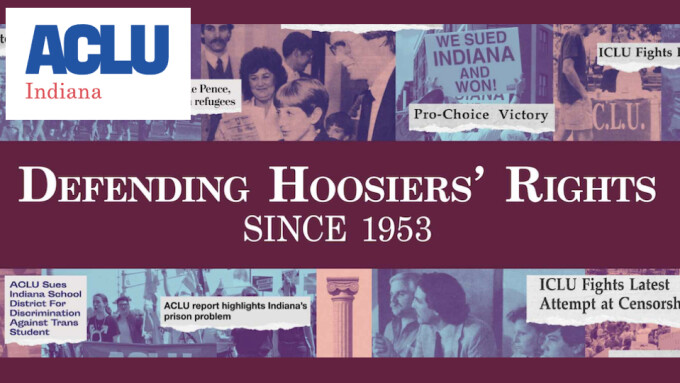INDIANAPOLIS — The American Civil Liberties Union of Indiana has warned that the state’s version of the age verification legislation being sponsored around the country by anti-porn religious conservative activists will likely result in censorship of LGBTQ+ and other constitutionally protected content.
SB 17, authored by Republican Sen. Mike Bohacek, was approved Tuesday by the Indiana state legislature.
The statement from the ACLU of Indiana follows:
The internet can feel like the wild west, a place where people of all ages, including children, are just a few clicks away from encountering explicit content. Given this digital landscape, it is understandable that parents want to shield their kids from materials intended for adults.
But SB 17, a bill aimed at limiting minors’ access to content online, would ultimately violate the constitutional rights of adult Hoosiers.
This bill stipulates that any website that displays “material harmful to minors,” is required to use an age verification method to guarantee only adults are accessing the website. If the website fails to do so, the parents of a child harmed by the website’s content can sue for damages. And, as passed in the Indiana House, the bill would also allow the Attorney General to sue companies who fail to follow the law.
An Unconstitutional Law
This legislation will undoubtedly have a chilling effect on free expression online. The legitimate fear of having personal information exposed may deter adults from accessing legal and consensual adult content, thereby limiting their freedom to explore and express themselves in a private digital space.
The Supreme Court has ruled that states can restrict a minor's access to adult material, but legislators must navigate a delicate balance mandated by the U.S. Constitution. The law cannot inhibit a minor's access while simultaneously burdening an adult's right to access the same material.
In a precedent-setting case, Reno v. ACLU, the courts deemed age verification requirements were unconstitutional when a less restrictive alternative exists. For example, the voluntary installation of parental control filters.
Privacy Concerns
If this law goes into effect it will require that Internet users share personal data, such as a photo ID, with companies that claim to verify the user’s age. This will block some people – for example, those that lack government ID’s or whose age is mis-identified by this technology – from accessing these sites.
Hoosiers can’t be confident that these businesses have the capacity or processes to verify user’s ages, while keeping this information private. The bill requires companies to delete users’ personal information immediately, but without proper protections, bad actors – hackers or disgruntled employees – could use someone’s personal data for exploitation.
And this isn’t just a hypothetical. Health insurers, massive retail corporations, and government agencies have all faced data breaches.
Unintended Consequences
Similar legislation in other states—Utah, Montana, Texas, Louisiana, Arkansas, Mississippi, North Carolina and Virginia — has drawn criticism for its unintended — or in some cases, intended — consequences.
In Utah, a similar bill caused PornHub — which receives 130 million total visitors per day — to block access to its site in the state, denying law-abiding adults access to constitutionally protected material. A statement from the company warned that the new age verification law could result in users seeking out sites with “far fewer safety measures.”
In some cases, companies may decide the financial burden of implementing the requirements outlined in SB 17 is not worth continuing to operate in Indiana. The costs of designing this age verification technology can easily surpass $100,000, plus the cost of potential lawsuits from parents and the Attorney General.
Ongoing Culture Wars
SB 17 uses the broadly defined phrase “material harmful to minors,” which could ultimately be used to target age-appropriate LGBTQ+ or sex education content. We’ve already witnessed a systematic effort to censor access to LGBTQ+ literature in Indiana’s schools and libraries using the phrase “material harmful to minors.”
The Internet may emerge as the new battleground in some legislators’ efforts to erase LGBTQ+ Hoosiers.
Parents can already determine what content is appropriate for their kids, and tools exist to help them manage their children’s time on the Internet. These existing tools can do the job of this bill, without infringing on Hoosiers' rights.
If Indiana lawmakers proceed with this legislation, it will surely be held up in the courts as we have seen in other states. Lawmakers should not jeopardize the First Amendment rights of Hoosiers in an effort to censor the Internet.
For more information, visit ACLU-IN.org.







